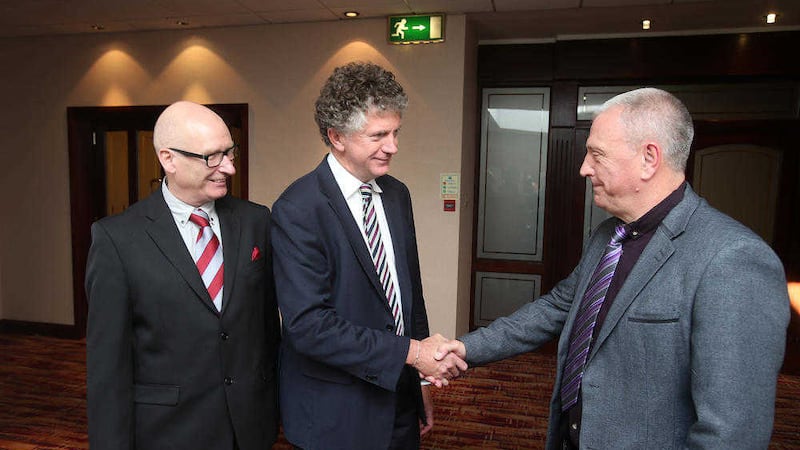Speaking after the launch of the Loyalist Communities Council on Tuesday afternoon the UDA’s Jackie McDonald said: “We need assistance to move on.”
He’s absolutely right. And they need that assistance because, since their ceasefire announcement of October 1994, they have barely moved at all. Indeed, the evidence suggests that the only movement they have made in the last two decades has been backwards.
The latest joint statement acknowledges ‘a vacuum in loyalist communities has been created which has led to significant disenchantment with politics and to our communities being largely ignored and neglected.’ It also identified ‘loyalist disenfranchisement’ as one of their core concerns.
But the loyalist community hasn’t been disenfranchised, because no one has removed their right to vote. They are choosing—yes, choosing—not to vote for the political parties which claim to represent them. That’s why the UDA-linked Ulster Democratic Party (which was involved in the 1997/8 negotiations) has disappeared. That’s why the UVF-linked PUP has no MLAs, only 4 out of 462 councillors and 2 per cent of the overall vote. Yes, loyalists may well be disenchanted with the political process, but it’s pretty clear that they are also very disenchanted with self-styled loyalist parties.
I was also struck by the fact that their agenda includes educational underachievement, employment, skills, welfare, culture, sport, youth, deprivation, broader political and economic matters and capacity building in unionist areas. This is pretty similar to the agenda set out by the Unionist Forum in January 2013—most of which wasn’t actually addressed. So it’s probably no bad thing that it should be revisited.
I have argued for years that the loyalist/working class unionist community has been ignored by mainstream unionism since 1921. It isn’t just since 1998 that they have been sidelined and left behind. They have always been regarded as a mixture of electoral fodder and potential on-the-street muscle, but I don’t think there’s ever been a thought through strategy for addressing their immediate, let alone their long term socio-economic needs. When the DUP kicked off it tapped into an anti-Big House Unionism sentiment to eat away at the UUP, yet it’s now the DUP who are regularly criticised for having their ‘snouts in the trough.’
And I’ve also argued that since the electoral evidence suggests that that same loyalist/working class unionist community seems reluctant to vote for parties with clear paramilitary links, it would make sense for a new political vehicle/voice to emerge. If they’re not voting in large enough numbers for the PUP (which seems to be the case) and they remain suspicious of the DUP/UUP, then it seems fair to conclude that, in the absence of a vehicle which does genuinely represent them, they’re likely to remain disenchanted and left behind.
I agree, as the joint statement says, that there needs to be a “vehicle for attracting meaningful funding and initiatives to assist loyalist communities throughout Northern Ireland, enabling loyalism to play a full and active role in the community and wider remit and in constitutional politics.” Loyalism should not be a dirty, scary word: yet the actions—many of them ongoing—of minority paramilitary groups who use the word for their own ends has succeeded in creating the perception that loyalism is bad and that loyalists are somehow beyond the pale. The UVF, UDA and Red Hand Commando have contributed to that perception and they should not be allowed to forget it.
Yet in exactly the same way that the IRA has a part to play in changing the dynamics and tactics of republicanism, I think that loyalist paramilitaries have to do the same when it comes to loyalism. But they need to bear one thing in mind before the first meeting of the Loyalist Communities Council: if they get it wrong, if this is just another tactical scam, if they turn a blind eye to the criminal activities of those who shelter under the title of their organisations, if this is just a back door for those who have been unable to get elected to the Assembly or councils, or if this is just another Del Boy jobs-for-the-old-boys gig, then they will be doing huge and probably irreparable damage to loyalism and working class unionism.
At this stage I’m prepared to give the project a fair wind. There is important work to be done and someone needs to do it. But the biggest challenge of all will be changing perceptions and closing down the criminal structures and activities which are presently destroying the communities they say need rebuilt. It would also help if mainstream unionism stopped conveying the impression that it is holding its nose when dealing with loyalism and the loyalist community: because, since 1921, it has played a considerable part in creating the present sense of despair and isolation within that community.








